I just want to push people to be more specific about: Which culture? Whose culture? Because that wasn’t my culture.
You’re listening to Burnt Toast. This is the podcast where we talk about diet culture, fatphobia, parenting, and health. I’m Virginia Sole-Smith. I also write the Burnt Toast newsletter.
Today I am chatting with Dominic Bradley.
Raised in the crunk-era "Dirty South," Dominic Cinnamon Bradley is a Brooklyn-based Black disabled queer visual artist, writer, and performer. In 2021 they were a RiseOut Activist-in-Residence fellow focusing on creating resources and conversation about mental health on behalf of BIPOC LGBTQIA+ New Yorkers.
Dominic is also a freelance sensitivity and authenticity reader who has worked with various publishing houses —and I was incredibly lucky to have Dominic as the sensitivity reader for Fat Talk. Sensitivity reads are a somewhat new, and very important, part of the book publishing process. So I thought it would be really interesting to have a conversation about what a sensitivity reader does and what it adds to the book—and also have you all get to know Dominic a little bit more, because they are amazing.
I’ll also take a minute to remind you to preorder Fat Talk if you haven’t already!
You can preorder your signed copy from my favorite independent bookstore, Split Rock Books (they ship anywhere in the US!1). You can also order it from your independent bookstore, or from Barnes & Noble, Amazon, Target, or Kobo or anywhere else you like to buy books.
And! You can now preorder the audio book from Libro.fm or Audible. (I’m recording this at the end of the month, so more on that process soon!)
I wrote last fall about why preorders are so crucial, but let’s review:
Publishers use preorders to decide how much to invest in a book in terms of its marketing and publicity.
This directly corresponds to the amount of media buzz a book generates (think NPR interviews, TV appearances, and prestigious book reviews—all of which contribute in their own way to preorders and sales once the book is out).
Retailers use preorders (and that related media buzz) to gauge how many copies of the book to stock in stores, and whether or not to display the book prominently in the window, on the new arrivals table, etc. Amazon and other online retailers use preorders to decide how hard to push a book on their homepage or new release lists. All of this also drives future sales, because people who see the book while book shopping, are much more likely to buy it than people who cannot see it.
And: It’s pretty rare to make a bestseller list without strong preorders. That’s because preorders all count towards your first week of sales—and that’s when most authors make a list.
I hope this conversation with Dominic makes you feel even better about supporting the book that Burnt Toast built. We are almost exactly three months away from pub date, so there is a lot more book talk to come (about events and giveaways and some great newsletter-only perks and behind-the-scenes access!). Thank you for being down for this piece of things. It means so so much to share this process with you all.
Episode 79 Transcript
Dominic
I am based in Brooklyn. I’m a visual artist, a writer, sometimes performer. And I also happen to do freelance work for publishing houses in regards to what’s known as sensitivity reads or authenticity reads.
Virginia
Do you have a preferred term, sensitivity or authenticity?
Dominic
I use them interchangeably.
Virginia
What got you into doing sensitivity reads in the first place? I’m curious to hear the backstory.
Dominic
Purely by accident. It was happenstance, really. There was an author who was not connected to a publishing house that I read for. Then there was an editorial firm that I read for and gradually I started to get deeper and deeper into it, until I ended up in a binder full of sensitivity readers. I was in several databases. That’s really how it happened.
Virginia
Which is so odd to think about, but yup, that makes sense. There are these binders full of people. Well, you really have a gift for it. Your notes were incredibly helpful on Fat Talk.
You and I were connected by the folks at my publisher, Henry Holt. You just completed a sensitivity reading of Fat Talk. It was really important to me to have a sensitivity read on this book for a lot of reasons. I did have to nudge the publisher a little, but they were very open to it. It’s an increasingly standard part of their process. But I was like, “We’re doing this, right?” And they were like, “Yes, yes, we’ll do it.” So why don’t we start by having you explain what is the sensitivity or authenticity read and what’s the purpose?
Dominic
The purpose of a sensitivity read or an authenticity read is to have someone with fresh eyes look at an author’s manuscript. And we’re looking for specific things. Let’s say that the author has a main character, or even a secondary character, that they’ve written that is outside of their own lived experience. They want feedback on making sure that those characters are as three dimensional as possible and that’s where I come in as a reader.
Virginia
I can see for fiction this being so valuable to help flesh out characters and give the really true context of their lives in that way. And what about nonfiction?
Dominic
I think that nonfiction can be approached much the same way. But in nonfiction, you’re not really assessing a character per se. What you’re assessing is, are these facts full-bodied? Are you getting the entire picture? Are there other things to know about this event, this place, this person, that the author may not have been clued into, because the author, again, does not have the lived experience?
Virginia
What are some of the challenges of doing this work?
Dominic
One challenge of doing the work is you’re very likely to encounter something that’s going to upset you. I think the other challenge would be trying to give feedback that propels the author forward, rather than “I don’t like this,” or “you should take this out,” or “this is bad.”
Virginia
Yes. “This is bad” is always a hard note to receive.
Dominic
Yes. So, attempting to go beyond that. For example, there was one manuscript where darkness had become synonymous with evil. So, just pointing out, “I’ve seen you do this a lot and you’re falling into this trope which has already been widely discussed and you may want to rethink how you approach that.”
Virginia
Yes. Do you think it was a, for lack of a better term, a blind spot of that writer, that they hadn’t put that together? Is that what you often find, authors are just not aware that they need to be sensitive to this? Or are there times where their bias is leading, so to speak?
Dominic
You know, it’s hard to speculate about that sometimes. In most cases, I would say, it’s lack of awareness, rather than someone leading with their biases, just because all of these things are baked into our society. It is pretty much the path of least resistance. I think that authors find themselves relying on these stereotypes and tropes sometimes without even being fully conscious of what they’re doing.
Virginia
And it is uncomfortable to have your biases named, but we’re never going to make progress if we can’t sit in that discomfort and learn from it and really deal with how it’s coming out.
You mentioned another challenge is the toll it can take on you, that you may read something that’s triggering or upsetting to you. Do you have any strategies for how you navigate that? How do you take care of yourself?
Dominic
Sometimes the way that I might be triggered by an author’s manuscript is not immediately obvious. Sometimes it’s very subtle. I pay attention to what I’m feeling. And sometimes it’s just a passage that I read it, and I’m like, something doesn’t feel right with this. I read it over. I sit with it to try to see if I can articulate what it is specifically that is troubling and that has turned out to be a good exercise.
Virginia
That makes sense. Both in terms of helping you identify what feedback you want to give to the author about why it’s troubling, but also for your own process around it.
Dominic
Yes.
Virginia
This potential for harm to ourselves is a tricky piece of this work. I mean, Fat Talk, as you know, is a book about anti-fat bias, which meant in the research of the book, I was often interviewing people who held really significant anti-fat bias. And as a fat person, it’s not fun to have those conversations but it felt like such an important part of doing the work. So I can relate a little bit to what you’re talking about there in terms of like, how do you protect yourself. When the work needs to happen.
One comment from you that struck me early on, when I got the manuscript back, and was first sitting down to look at the notes—the comment that right off the bat, I was, like, “oh, this is going to be very useful” was, I think, in the introduction. I’d written something like, “our culture teaches us that the ideal body is thin,” and you just wrote, “Do you mean white culture?”
And I was like, Oh. Yes. This is what I need. I’m not realizing I need to specify which culture I’m talking about. Because my white privilege lets me assume everyone knows what I mean by culture.
Dominic
Yeah, I think that’s common. And you know, I just want to push people to be more specific about: Which culture? Whose culture? Because that wasn’t my culture. The impulse to number one, not name this as white culture and number two, to position it as universal, that’s common unfortunately.
Virginia
Well, it was a really helpful note and it helped me then go through and look for other instances where I was doing that and tighten it up a little bit, hopefully.
There is also a section where I deal with Michelle Obama, who is a really complicated person in the conversation of anti-fat bias. And your notes there were also just incredibly helpful, because it helped me realize how important it was to acknowledge her personal experiences both in the conversations around the fatphobia that she experienced and anti-black racism and sexism. And you really helped me sharpen that up a lot. So I really appreciated that, because I was mindful that I didn’t have the right lived experience to do her justice, if that makes sense.
Dominic
Yeah, I actually remember that part. Again, I want to be careful not to absolve her of responsibility for the way that she approached these campaigns. But it’s also important to realize that Michelle Obama’s body and her daughter’s bodies were going to be scrutinized in a way that was unprecedented, because they’re Black women. And also, that politically speaking, she was going to be funneled to whatever the administration deemed least controversial, least offensive. It gets a little bit complicated.
Virginia
Yeah. And in introducing her, I think I identified her as like “a beloved public figure.” And you were like, “Um. She was not universally beloved.”
Dominic
Not at all. Yeah, she was called all kinds of — monkey, all kinds of things—and like, they went for her.
Virginia
Horrendous. And again, it was just an example of, oh, Virginia, you’re in your little liberal bubble where everybody worships Michelle Obama. Which is one piece of this, but you cannot describe her as universally beloved. So that was such a helpful note and then helping me sharpen the sections where I did talk about the stigma she experienced. And the piece about the administration was such an excellent point and how they couldn’t give her any topic that would look like she was honestly like doing anything overtly political, right? Because she was already under such scrutiny that it would have led to such a backlash.
And then, of course, what does it say that we’ve decided that an “uncontroversial” issue we can give her is childhood obesity, even though that should not be a neutral topic.
So being a sensitivity reader is definitely not your only gig. I read in your bio that you are a recovering social worker and also an artist who works in visual art, writing, and performance. I would love to know more about that work and particularly how your art intersects with your mental health work.
Dominic
In 2021, I had a fellowship with the LGBT Center in Manhattan. It’s called the RiseOut Activist-in-Residence fellowship, where I developed this mental health initiative that has three parts to it. The first was the development of an adult coloring book featuring members of the community with mental health affirmations on it. And then the second was a wellness demo video on how to create a one page wellness plan using visual note taking techniques. And then the third component was actually a panel composed of four community members who were talking about transgenerational strengths when it comes to mental health.
Virginia
Ooh, say more about transgenerational strengths around mental health.

Dominic
There is a quote, I think it can be attributed to to a person named Xavier Dagba. But that quote, I’m paraphrasing, said, “Your ancestors gave you more than just wounds.” They gave you strengths, also. So I curated some questions to dig more deeply into that theme and it was a good discussion.
Virginia
It’s such a powerful reframing of the way these stories too often get told. And is the coloring book something that’s still available for folks?
Dominic
I still have a lot of books left from this first print run. And I would love to give them away to people. With everything that’s been happening, I have not had a chance to go out and bring my books, give my spiel.
Virginia
It’s a lot of work.
Dominic
And get them in the hands of people who will use them.
Virginia
Great. So folks who are interested can get in touch. Do you have any projects you’re either working on now or thinking about working on in the future that you’re excited about?
Dominic
I can say broadly that I am working on, I want to work on, some visual things. And I’m also interested in working on some writing. I don’t want to say more because I don’t want to jinx it.
Virginia
Totally hear you.
Dominic
So I’ll leave it at that. But yes, there are some things that I very much am hoping to complete this winter.
Virginia
Amazing. Well, we will certainly be waiting to see it and celebrate it when you’re ready for it to be in the world. And I know that process can be circuitous at best.
Butter
Dominic
Well, I am excited about a purchase that’s coming. Now both of us wear glasses, right?
Virginia
Yes, and I’ve been admiring your glasses this whole conversation.
Dominic
See, what I like to do is to get my eyes checked and get the information about the prescription. And then I go to fun websites like Zeelool, Zenni, VoogueMe, and I go on a mini shopping spree in which I can get the cutest prescription frames. So, these just came a day or so ago and I have another pair that’s coming in a little while. Right now I’m in the midst of building my glasses collection back up because my prescription changed a little bit. And it’s slowly but surely, though, yes. So that that’s kind of a quirk of mine is getting all these glasses.
Virginia
We have this deeply in common, Dominic. I have many pairs of glasses. I did not know, however, about these online shopping options. So I’m very excited you shared this.
I just want to share it for listeners because they won’t be able to see you. Dominic’s glasses are like a tortoise shell on top—is that right? And then yellow on the bottom half. And folks who know me know I have a tortoise shell with a light blue on the bottom half that’s like my favorite pair. So I’ve been obsessed the whole conversation, like they come in yellow! There’s a yellow pair! They’re so good. I have a local glasses shop that’s really wonderful and so I usually like get my eyes checked there and then buy their glasses, but you just opened up a whole world of possibility.
Dominic
A whole world. You can be free.
Virginia
This is exciting. Yeah, there’s gonna be some some damage done to the credit cards.
Dominic
No, but the great thing about it is they often have sales.
Virginia
Right? Right.
Dominic
So you don’t even have to pay full price.
Virginia
Oh, that’s exciting.
Dominic
And if you can tolerate having thicker lenses, that’s a way that you can save, too.
Virginia
Yeah, thicker lenses are kind of just a fact of my life because my prescription is so strong that they can never make them that thin. What does the pair that you are waiting on, what do they look like?
Dominic
Okay, so they’re kind of like, the shape of the glasses is aviator. This part is magenta and then on top is like a tortoise shell.
Virginia
Oh, amazing.
Dominic
So I’m excited to see what those are going to look and feel like.
Virginia
I might need you to send a picture when they come. They sound fantastic. My nine year old daughter just got her first pair of glasses and my husband is also really into glasses. We’re kind of known, like, we’re glasses people. And we’re both like, “Oh my God, baby’s first glasses!” And she picked two pairs. Because, you do need backups, especially with kids. They might lose them. One pair is like a bright pink-y red and they they’re very round and they have little cat ears on the top like so they look like like how there’s like the cat eyeglass? These literally have little cat ears. They’re so cute. Oh my gosh, and the other pair is blue and they have rainbow hearts on the arms. It’s like really come a long way from when I was a kid, anyway.
Dominic
Oh, yes. Absolutely.
Virginia
I’m gonna recommend an artist that I’m really excited about. Her name is Favianna Rodriguez and she uses absolutely gorgeous, very bright colors. She does a lot with plants. She has a whole houseplants series, like flowers from her garden, also really beautiful portraits of women. It’s all collage. They’re just stunning. And we were able to get a piece of hers for our dining room that I’m just obsessed with. It’s multi-layered. I mean, the intricacy of it just blows me away. And she’s an amazing feminist activist, just all around awesome person.
So Dominic, thank you so much. It was truly an honor to have you do the sensitivity read on fat talk. It helped so so much. And it’s been a real joy to get to talk to you about it, too. So thank you. Can you tell listeners where we can follow you and how we can support your work?
Dominic
I’m on Instagram at @DomDoesDreams. I also have a website that’s still looking a little rough, I’ll go ahead and admit it. But you can also find me at Domdoesdreams.com. And by the way, if anyone wants to help me with said website, by all means.
Virginia
I love it. Great. Well, thank you for being here.
The Burnt Toast Podcast is produced and hosted by me, Virginia Sole-Smith. You can follow me on Instagram or Twitter.
Burnt Toast transcripts and essays are edited and formatted by Corinne Fay, who runs @SellTradePlus, an Instagram account where you can buy and sell plus size clothing.
The Burnt Toast logo is by Deanna Lowe.
Our theme music is by Jeff Bailey and Chris Maxwell.
Tommy Harron is our audio engineer.
Thanks for listening and for supporting independent anti diet journalism. I’ll talk to you soon.
UK/Australia/New Zealand/rest of the Commonwealth: Stay tuned! I just signed the deal on these foreign rights and should have preorder info for you soon.


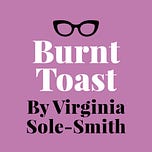

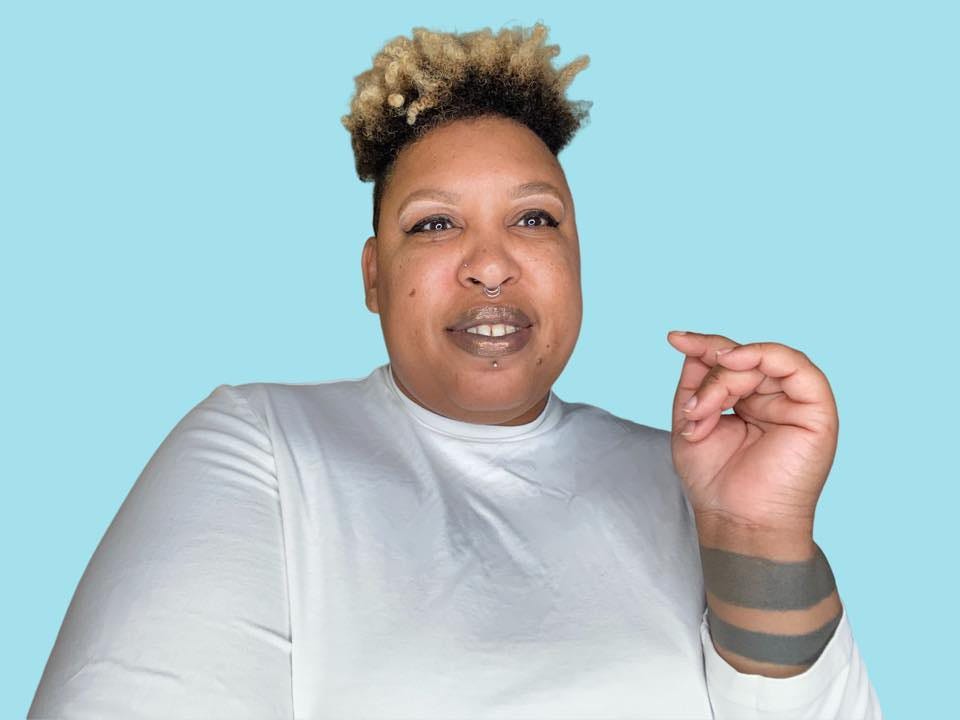
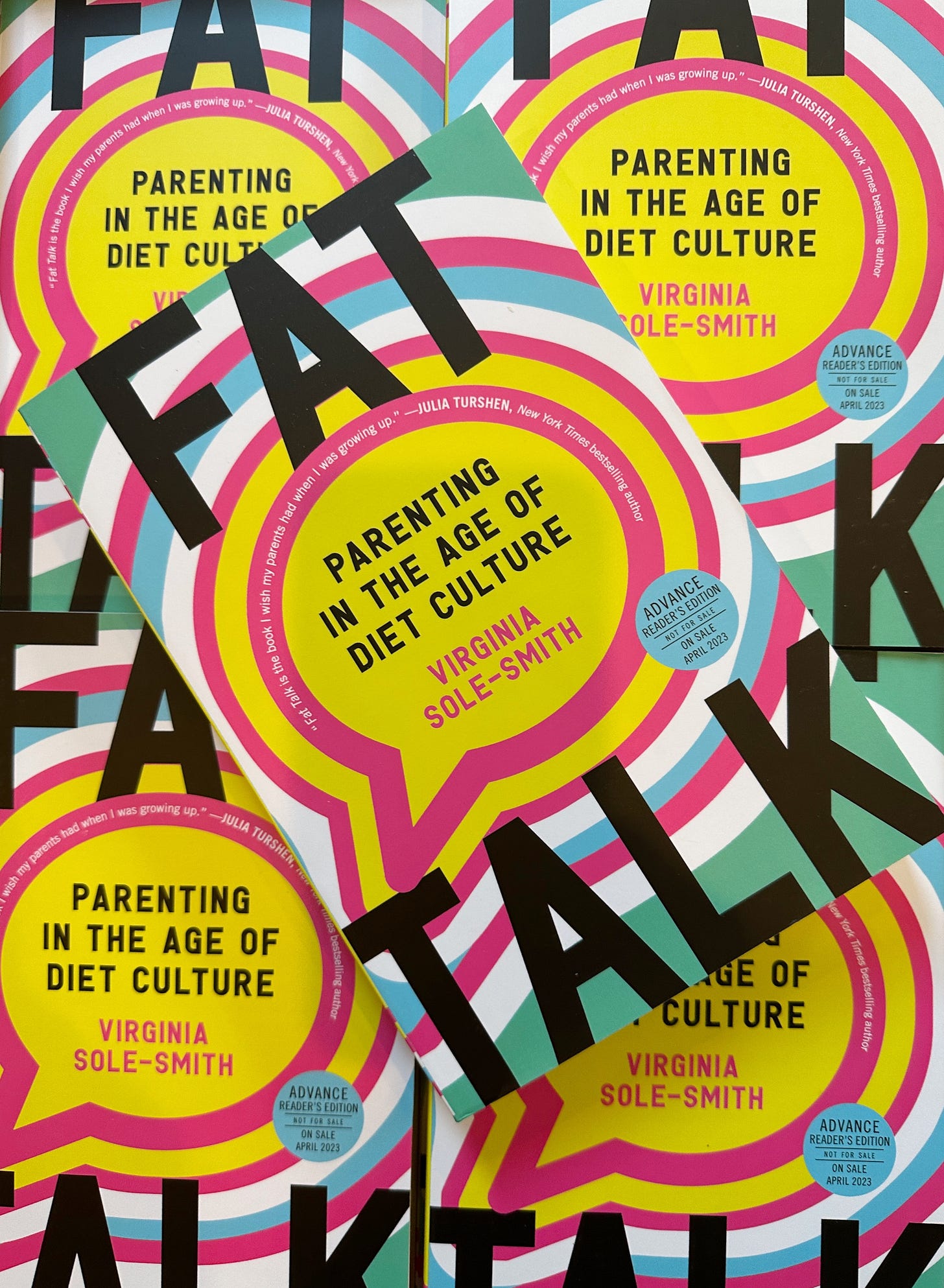


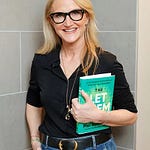
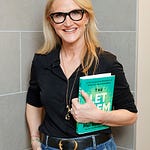
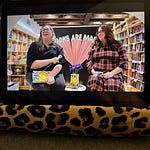

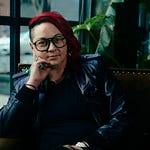


Share this post